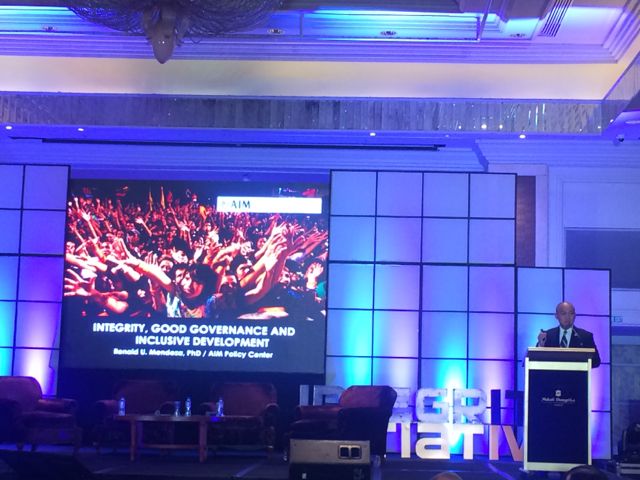SUMMARY
This is AI generated summarization, which may have errors. For context, always refer to the full article.

MANILA, Philippines – Governance is said to be a two-way street. Those in office and the people they lead ideally work together, not just for the implementation of programs and policies, but also to curb crooked practices in government.
In his speech during the Integrity Summit hosted by the European Chamber of Commerce of the Philippines (ECCP), President Benigno Aquino III reiterated the need for the private sector to have “zero tolerance for corruption.”
“There are always those in a position of power abusing their positions, but there are also those willing to partake in their schemes—or even just stand idly by, while others steal from the nation’s coffers,” Aquino said before at least a hundred participants gathered on Wednesday, December 9.
“The only way we can truly end corruption in the Philippines is by taking a holistic approach—one that involves both government and the private sector,” he added.
But how does the private sector play its part?
Challenge to civil society
Good governance scholar Ronaldo Mendoza believes it is through “restoring the integrity of citizens.”
Also speaking in the summit, Mendoza shared a citizen’s disturbing remark on a specific instance of corruption: “[It is okay] even if they are corrupt, as long as they take care of us.”
He also cited a study by the Asian Institute of Management (AIM) that found that 20% to 40% of Metro Manila residents sold their votes in the 2013 elections.
“If this is the integrity of our citizens, then how can we expect the level of integrity of the leaders we elect?” Mendoza said.
Systemic problems
Mendoza also noted that the current “pattern of leadership” is “likely going to lead to abuse.” (READ: Limiting political dynasties will help the poor)
According to AIM’s research, there is a huge percentage of local leaders coming from political dynasties, as aggregated:
- Governors – 85%
- Vice governors – 75%
- District representatives – 75%
- Mayors – about 70%
- members of Sangguniang Panlalawigan – 60%
- Vice mayors – 50%
- members of Sangguniang Bayan – 42%
Given this, Mendoza urged participants to be more discerning of their leaders and public institutions “by exchanging views on how to make [them] more accountable” and “electing good leaders.”
Stressing this, Peter Koeppinger of political foundation Konrad Adenaeur Stiftung said: “Integrity can’t come from top down, it has to come from bottom up and we have to bring these things together. This is one of the challenges that is not addressed enough in the country.”
In recent years, the Philppines saw an improvement in terms of good governance based on Transparency International’s Corruptions Perception Index.
During the last year of former President Gloria Macapagal-Arroyo’s term, the Philippines ranked 139th out of 180 countries. The ranking improved in 2011, one year into the Aquino administration, at 129th out of 178 countries.
The country’s ranking continued to improve after that, jumping to 85th place in 2014 from 105th in 2012. However, the Philippines is still considered among the highly corrupt nations in the world. – Rappler.com
Add a comment
How does this make you feel?
There are no comments yet. Add your comment to start the conversation.